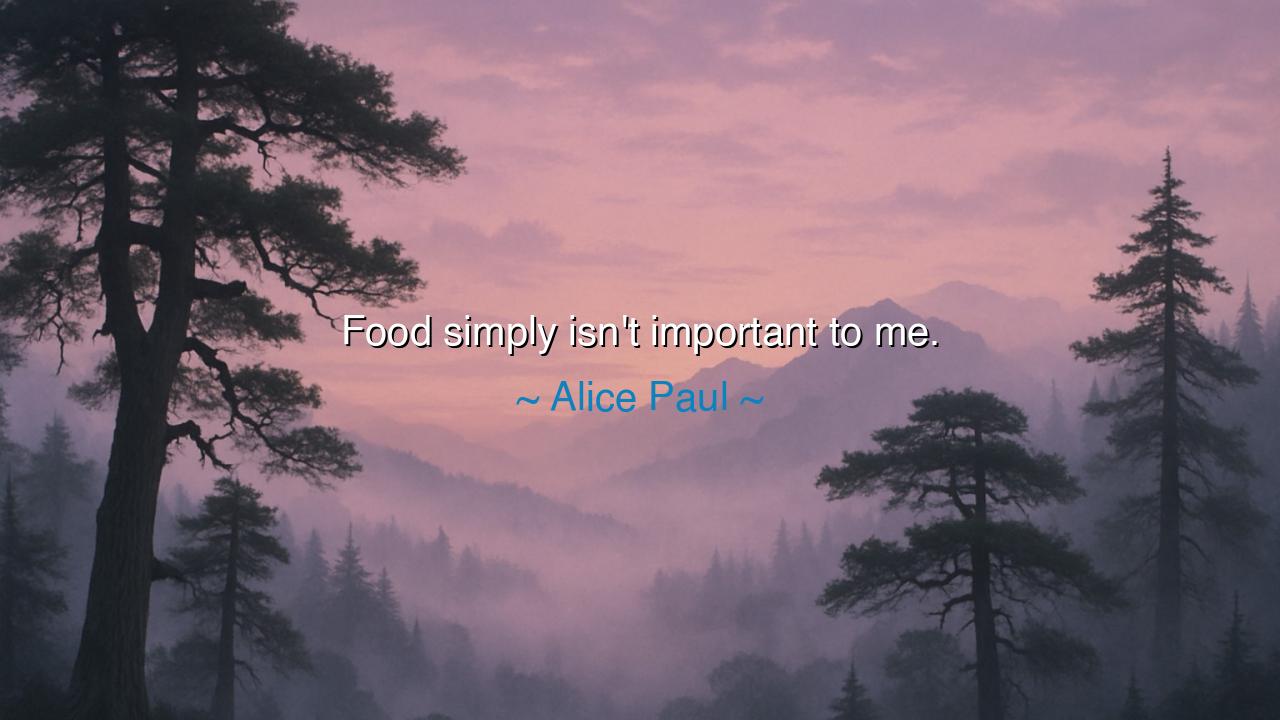
Food simply isn't important to me.






Host: The room was small, bare, and bright — sunlight pouring through tall, uncurtained windows. The air smelled faintly of paper, ink, and determination. A single wooden desk stood at the center, covered with letters, pamphlets, and a chipped cup of tea that had long since gone cold.
Beyond the glass, the city of 1917 Washington D.C. buzzed faintly — the sound of carriages, protests, and progress colliding in the streets. It was the kind of day that felt both eternal and immediate, the air thick with purpose.
Jack stood by the window, sleeves rolled, reading a newspaper. Jeeny sat at the desk, her posture straight, her expression solemn but alive, her fingers absently tracing the edge of a leaflet that read in bold: VOTES FOR WOMEN.
Jeeny: quietly, almost as if reading from memory “Alice Paul once said, ‘Food simply isn’t important to me.’”
Jack: turning from the window, smirking faintly “I remember. She said that during one of her hunger strikes, didn’t she?”
Jeeny: nodding slowly “Yes. To her, eating felt trivial compared to equality. She starved herself for an idea.”
Jack: leaning against the window frame “You’ve got to be half saint, half steel to do that. She wasn’t just defying a government — she was defying nature itself.”
Host: The clock on the wall ticked faintly, each second a heartbeat between conviction and collapse. Jeeny’s gaze moved toward the window, to the world outside — the marchers, the banners, the endless movement of history inching forward on tired feet.
Jeeny: softly “When she said food wasn’t important, she wasn’t being careless. She was saying that comfort is irrelevant when you’re fighting for meaning.”
Jack: quietly “Still, it’s a dangerous kind of devotion — to forget your body for the sake of your beliefs.”
Jeeny: meeting his eyes “But isn’t that what every great reformer does? They burn themselves as torches so the rest of us can see.”
Host: The sunlight shifted, slicing across her face, illuminating the sharp conviction in her eyes. The room seemed smaller now — charged with the gravity of that kind of sacrifice.
Jack: after a pause “I wonder if she was ever afraid.”
Jeeny: softly, almost reverently “Of course she was. Fear is just proof that you’re still human while doing something inhumanly brave.”
Host: Outside, the faint sound of chanting drifted in through the window — women’s voices rising in unison, clear and strong despite the fatigue that laced them.
Jack: listening “You hear that? That’s the sound of hunger too. Different kind. The kind that feeds the soul.”
Jeeny: nodding “Exactly. Alice Paul wasn’t rejecting food — she was redefining nourishment. Her hunger was her protest. Her emptiness, her language.”
Jack: quietly, with awe “A body turned into a manifesto.”
Jeeny: smiling faintly “Yes. And the world had no choice but to listen.”
Host: The camera lingered on the room — on the desk littered with leaflets and open envelopes, on the cup of untouched tea now reflecting the slanted sunlight. It looked less like clutter and more like testimony — the aftermath of purpose.
Jack: softly “You think people today could ever understand that kind of sacrifice?”
Jeeny: sighing “I think they’d call it madness. We’ve made comfort a virtue and conviction a flaw.”
Jack: quietly “Then maybe we’re starving for the wrong reasons.”
Jeeny: turning toward him, her eyes full of quiet fire “Maybe. But every generation needs someone willing to go hungry for the truth.”
Host: The clock ticked louder now, as if echoing her words. Jeeny picked up one of the pamphlets, reading its header aloud.
Jeeny: firmly “Equality cannot be postponed. That was her slogan.”
Jack: smiling faintly “And she meant it — down to the last breath.”
Jeeny: softly, with conviction “She taught us that the appetite for justice must always outweigh the appetite for safety.”
Host: A draft of wind swept through the open window, fluttering the papers on the desk. For a brief moment, the sound of marching boots and chanting women filled the space, blending with the heartbeat rhythm of the clock.
Jack: after a long silence “So, when she said food wasn’t important…”
Jeeny: finishing his thought “…she meant that freedom was her sustenance.”
Jack: smiling faintly “And courage her feast.”
Host: The light deepened, turning the room into a portrait of devotion — two figures surrounded by the relics of a movement, the air thick with memory and meaning. Outside, the chants grew louder, merging into the pulse of the century that Alice Paul had changed with her will.
Jeeny stood, walked to the window, and looked out at the horizon — a soft fire in her eyes.
Jeeny: quietly “She starved not to die, but to remind the world how alive she was.”
Jack: softly, after a pause “And how asleep the rest of us were.”
Host: The camera pulled back, capturing the small room in its entirety — the cluttered desk, the bright light, the two of them standing by the window as if peering into history itself. The echo of footsteps outside faded into silence, leaving only the ticking clock and the soft sigh of the wind.
And in that stillness, Alice Paul’s words took on new life — not defiance, but discipline; not despair, but devotion:
True hunger is not for food, but for freedom.
The body can endure emptiness when the soul is full of purpose.
Those who starve for justice never go unfed by history.
For even when the world refuses to listen —
the sound of a single empty plate can shake empires.






AAdministratorAdministrator
Welcome, honored guests. Please leave a comment, we will respond soon